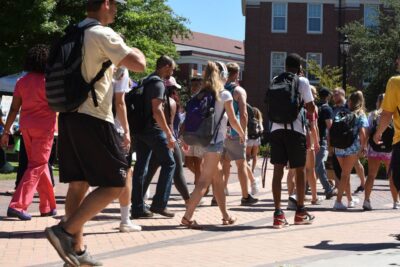Improve student success through digital and technological engagement
The views and opinions expressed are those of the author and do not necessarily represent the views or opinions of EAB.
Technology has played an increasingly important role in student success as student information technology, learning management systems, and other student success resources have evolved in the digital space. The pandemic increased higher education’s reliance on digital platforms for students to be able to access and engage with their campus support resources and educational opportunities.
As we considered the problem we wanted to address, one theme we noticed across both our institutions was what we describe as an issue of “digital overwhelm” for students. Students are being asked to use and engage with many different technological platforms and modalities in their higher education experience and beyond. Often it’s challenging to distinguish between the essential priorities for student success and what aspects are just good things to know (Hubbard, 2021). Additional context for the problem included:
- The variability of technological aptitudes and access across student populations depending upon economic situations, past educational environments, and learning differences
- The importance of engagement in these platforms for student success because so many of our university business and enrollment processes are digital, as well as learning tools, resources, and even courses themselves
- The necessity of digital literacy as a desirable skill that employers are seeking as we consider building career readiness in students as well (AAC&U, 2021)
Given this shared problem, we sought to identify a solution in the context of each of our unique campuses. First, we worked to identify the platforms that were necessary for students to use, and worked to describe and define them in terms of the user audience. Helping students, faculty, and staff understand the basic premise of each platform can go a long way in helping those individuals identify the appropriate tool for their needs.
Secondly, we highlighted the importance that users play in these types of projects. Whether providing direct feedback on the platforms or using their perspective when describing each tool, involving stakeholders in the process is vital for success.
Using those perspectives and the descriptions of each of the platforms, we each developed a way to inform those targeted audiences. At Biola, a website highlights and describes each of the pertinent technology platforms, and at the University of Kentucky an infographic contains that information.
These tools are tangible resources that outline the foundational information needed for orienting and training key stakeholders on the necessary digital resources. Strategies have also been developed for continuous improvement and changes that will need to be made to these resources as users provide their feedback. Our hope is that these resources will help to simplify the technological experience by clearly defining the role that each of the platforms play in supporting student success.
We are thankful to our institutions for supporting our work and this opportunity, EAB Rising Leaders mentors and facilitators for sharing their knowledge and expertise, and grateful for the many resources and significant research available through EAB to guide and strengthen our ideas. Our partnership with one another was also a highlight of our time in the Rising Leaders program, so we are particularly thankful for the opportunity to collaborate with excellent colleagues in the field.
More Blogs

A winning platform for higher education in a high-scrutiny era

Five trends that give community colleges a surprising edge in 2026
